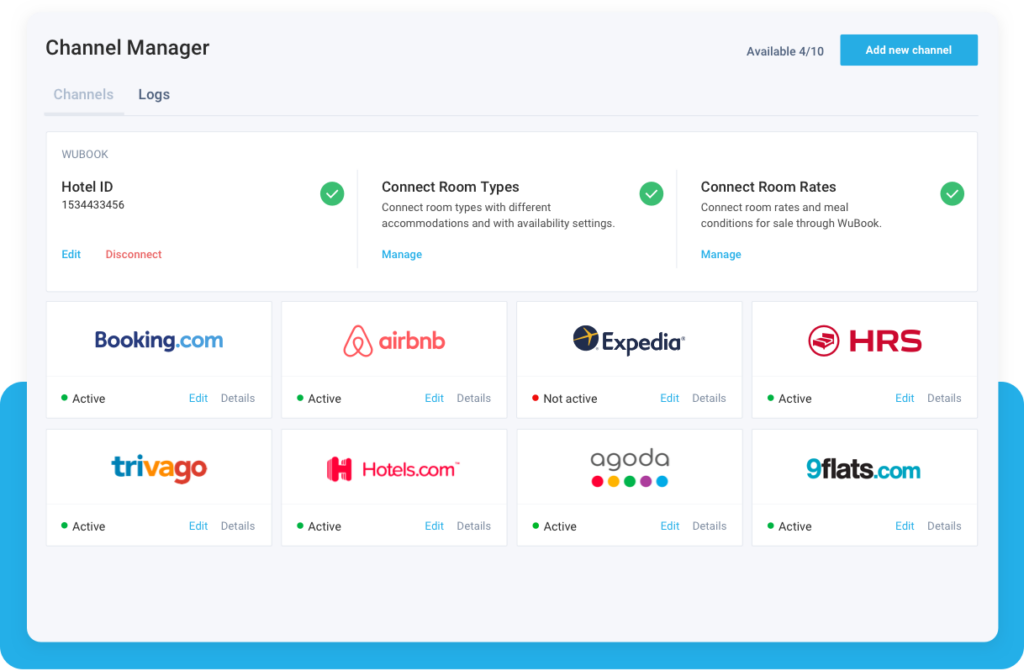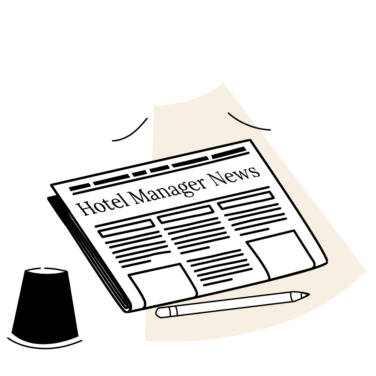Let me tell you a little secret about running a hotel—managing bookings without the right tools is like juggling flaming torches while riding a unicycle. Trust me, I’ve been in this industry for years, and I’ve seen how chaotic it can get when reservations from all kinds of websites come pouring in. That’s where a hotel channel manager solution comes in; it’s a non-negotiable in today’s uber-cluttered world wide web.
Think of a channel manager for hotels like the conductor of an orchestra. It takes all the moving parts—your room inventory, prices, and availability—and keeps them in harmony across all the platforms where your guests are searching for a place to stay. Instead of you trying to keep up with every website, it handles the heavy lifting, so you can focus on what you do best: providing an unforgettable experience for your guests.
In this article, I’ll walk you through what a channel manager is, how it works, and why it’s the secret weapon every hotelier needs in their toolkit. Let’s dive in!

What is a channel manager?
A channel manager is a tool that helps hotels manage their online bookings. It connects your hotel to different booking websites, like Expedia or Booking.com, and lets you update information, prices, and availability all in one place. Instead of logging in to each site individually, a channel manager makes it easy to control everything from a single dashboard.
A channel manager is a key part of hotel management because it streamlines the process of managing room availability, rates, and bookings across multiple platforms, reducing errors, saving time, and maximizing revenue opportunities.
A hotel channel manager is an alternative to direct bookings and may be used to manage multiple online distribution channels efficiently, ensuring real-time updates for rates, availability, and inventory across platforms like online travel agencies (OTAs) and global distribution systems (GDSs).

How does a hotel channel manager work?
A hotel channel manager works by syncing your hotel’s booking details with various online platforms. When a guest books a room on one website, the channel manager automatically updates your availability across all other platforms. This functionality reduces the chances of double bookings and saves you from doing the updates manually. It’s like having an assistant that keeps everything in order for you.
When it comes to your channel manager, the hotel manager will be responsible for ensuring it is set up correctly, maintaining accurate inventory and pricing, monitoring performance, integrating it with other hotel systems, and training staff to use it effectively for seamless operations.
How to Use a Channel Manager: Pro Tips
Using a channel manager effectively can save you time and boost your bookings. Here are some pro tips for hotel managers to make the most of it:
- Set up your inventory carefully: Double-check that all your room types, rates, and availability are entered correctly. Mistakes here can lead to lost bookings or unhappy guests.
- Keep your rates competitive: Use the channel manager to monitor market trends and adjust your prices accordingly. Many tools come with built-in analytics to help you stay ahead of the competition.
- Update your content regularly: Guests love detailed and accurate information. Keep your photos, descriptions, and amenities up to date across all platforms using your channel manager.
- Leverage dynamic pricing: If your channel manager allows it, set up dynamic pricing strategies to automatically adjust rates based on demand, season, or occupancy.
- Sync with your property management system (PMS): Integrate your channel manager with your PMS to streamline operations. This ensures all bookings are updated across systems without manual input.
- Monitor performance reports: Use your channel manager's reporting tools to analyze your sales, identify trends, and see which platforms perform best. This helps you focus your marketing efforts.
- Test regularly for errors: Check your listings periodically to ensure the sync is working correctly. A small glitch could cause big problems if left unnoticed.
- Train your staff: Make sure everyone who interacts with the channel manager knows how to use it properly. This ensures consistency and avoids unnecessary mistakes.
- Take advantage of support and resources: Most channel managers offer training materials, customer support, or webinars. Use these to stay updated on features and best practices for any booking engine.
By following these tips, you’ll not only make your channel manager work efficiently but also maximize your hotel’s potential for revenue and guest satisfaction. Knowing the ins-and-outs of popular channel managers is an essential hotel management skill in today's digital world.
How to Choose the Best Hotel Channel Manager Provider
When choosing a channel manager, look for one that integrates with the platforms you use most. It should be easy to use and provide good customer support. Test the software through a free trial or demo to see if it fits your needs before committing.
Don’t forget to pick tools with the right features! Here are the key features any channel manager for hotels should have:
Key Hotel Channel Manager Software Features
These are the top features I look for in a channel manager system for hotels:
- Room inventory management: A channel manager helps you manage how many rooms you have available to sell. It shows all your inventory in one place and updates it as bookings are made.
- Real-time booking updates: When a room is booked, the channel manager instantly updates your availability on all connected websites. This ensures your listings are always accurate.
- Multi-channel reservation management: It keeps track of all your bookings from different platforms and stores them in one system, so you can see everything in one view.
- Data synchronisation and communication: A channel manager ensures all your online platforms work together smoothly. It keeps your rates, availability, and information synced across every channel.
Remember that a lot of industries may use channel managers (just think about an ecommerce store selling across their website, Amazon, Pinterest, and Instagram, for example), so you need to find one that specializes in property and room rentals.
10 Best Channel Managers for Hotels
Here are the hotel channel managers that I personally recommend, based on hours of research and testing.
Benefits of a Channel Manager for Hoteliers
Why use a channel manager for your hotel? Because you will get real, tangible benefits, obviously! Here’s what you can expect:
Revenue Optimization
A channel manager is your go-to tool for dynamic pricing strategies. It allows you to adjust room rates based on demand, seasonality, or special events. For example, during peak holiday seasons or local festivals, you can raise prices to maximize revenue.
On slower days, you can offer discounts to attract budget-conscious travelers. With real-time updates, these pricing changes are instantly reflected across all booking platforms, helping you capture every opportunity to boost your profitability.
Increase Online Bookings
When your hotel is listed on multiple booking platforms like TripAdvisor, Expedia, Booking.com, and Airbnb, your visibility skyrockets. A channel manager ensures that your inventory is consistently available on these sites, making it easier for potential guests to find and book with you.
The more booking channels you’re on, the broader your reach, which ultimately leads to increased hotel room bookings and fewer empty rooms.
Reduce the Risk of Overbookings
Overbookings can ruin a guest’s experience, leading to cancellations and harming your reputation. A good channel manager eliminates this risk by using a pooled inventory system that automatically updates room availability across all online distribution channels, including your hotel’s website, metasearch engines, and partnerships with travel agents.
This synchronization ensures you don’t accidentally sell the same room to multiple guests, reducing cancellations and maintaining smooth day-to-day operations. By analyzing channel performance, a channel manager helps you make informed decisions about your channel mix, focusing on performing channels that drive hotel bookings and increase hotel revenue.
Improve Brand Recognition
Being present on well-known booking platforms helps your hotel gain exposure and credibility. Guests browsing these sites are more likely to trust your property when they see it consistently listed with accurate information and positive reviews. This increased visibility can help you build a stronger brand and encourage guests to consider your hotel for future stays.
Leverage rate parity across all booking sites sales channels to ensure you aren't overcharging compared to independant hotel competitors. This should be a core part of any hotel reputation management strategy.
Remove Manual Processes
Managing bookings manually across multiple platforms is time-consuming and prone to errors. A channel manager automates these updates, saving you valuable time and reducing mistakes. This allows you to focus on providing exceptional service to your guests instead of spending hours juggling inventory and rates.
This type of automation is essential for any connected channels distribution strategy, as it can significant lower the risk of human error by reducing the need for manual updates.
Build a Seamless, Integrated Tech Stack
A channel manager works best when it integrates with your other hotel systems. This creates a connected ecosystem where your operations, pricing, and guest data flow seamlessly. Here are some other software solutions you will want your channel manager to plug into with ease:
- Hotel Property Management System (PMS): A software solution that helps manage daily hotel operations like reservations, check-ins, housekeeping, and billing.
- Revenue Management Platform: A tool that analyzes data to optimize pricing and room inventory based on demand, market trends, and guest behavior..
- Hotel CRMs: Customer Relationship Management systems designed for hotels to manage guest data, communication, and loyalty programs.
- Hotel Upsell Tools: Software that helps hotels offer additional services or upgrades to guests, such as room upgrades, spa packages, or late checkouts.
More Learning
As you explore hotel channel management, I encourage you to keep learning about additional hospitality management and hotel marketing strategies. Here are my recommendations for ongoing hotel industry L&D:
- Read popular hotel management books from authors with hospitality experience.
- Listen to hospitality industry podcasts for easy-to-digest tips and tricks weekly.
- Sign up for hotel management newsletters that inspire you (steal their ideas!).
- Attend hospitality conferences and events to network with fellow hoteliers.
What Next?
Don't forget to browse around the site for more great hotel management tips, templates, and tools. Plus, join The Hotel GM newsletter for expert tidbits sent right to your inbox!


